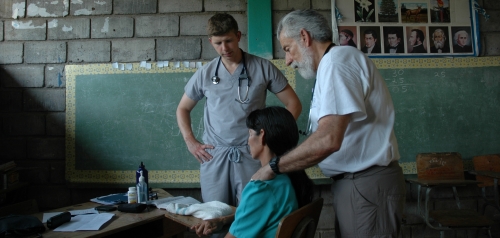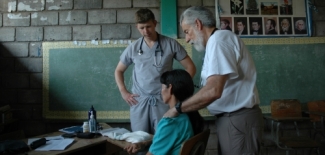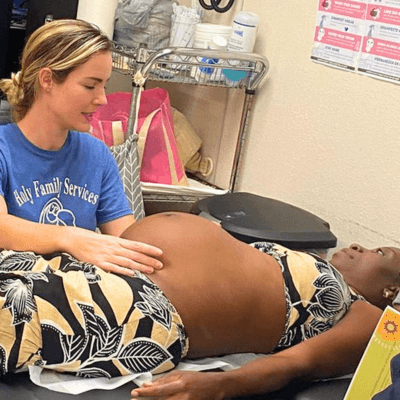BRIEFING: A Clinician's Call for Safer Farmworkers and Families
Today and tomorrow on Capitol Hill, more than a dozen farmworkers from across the nation are meeting with their members of Congress to call for the implementation of stronger protections for farmworkers from pesticides. MCN's Chief Medical Officer, Dr. Ed Zuroweste, MD, will join the farmworkers and a coalition of allied groups at a briefing for members of Congress and their staffers about the urgent need for an update to EPA's Worker Protection Standard. Here is the statement he will deliver today at the briefing:
I am a primary care provider. I am a family doctor, and for over 30 years I have cared for farmworkers and their families.
I am here today speaking for frontline clinicians who care for migrant and seasonal farmworkers.
As primary care clinicians caring for farmworkers, we can only do so much to treat a farmworker overexposed to pesticides. But the problem of farmworkers and pesticides goes much deeper than what we see and can do in the exam room. We are often frustrated that what could easily be avoided by prevention is much more difficult and unsatisfactory to diagnose and treat after a pesticide exposure.
Clinicians need our protective agencies to help us We need agencies charged with protecting workers to help us in safeguarding our workers. The proposed changes to the Worker Protection Standard are a step in the right direction to keep the people who work tirelessly to put food on our tables safer on the job.
For those of us who choose to work with farmworkers, it's frustrating to have to work with a population that we know is exposed to very dangerous chemicals. Because we are always trying to figure out if their health problems are work related or if their nausea and vomiting or other symptoms are from something else. We don't have the tools to make the proper diagnosis.
Our first goal when it comes to protecting workers is that we want a workplace environment where people do not have to work with such dangerous chemicals.

Prevention is key
In a perfect world the elimination of dangerous pesticides would guarantee that workers would not get poisoned. Until we reach that 'perfect world' we should strive to substitute and use less toxic chemicals. We shouldn't lose track that this should always be our ultimate goal. But since we are still far away from this perfect world, we need to emphasize other ways to keep the worker safe.
If farmworkers do have to work with pesticides, it's really a no brainer, that if someone is going to work with a chemical, the worker must know what chemical they are working with. The worker must know the health effects both long term and short. And the worker must know how to protect themselves and their families from exposure. In order for them to get this information, they need better and more frequent training. They need to understand the risks and ways to protect themselves in a language they understand and in way that acknowledges literacy and culture.
Too often when we see farmworkers who have been overexposed to pesticides, they have stayed longer in fields than they should have and gotten further exposed because they are not aware that the symptoms they are experiencing are due to the chemicals in their work place. They are not aware and they desperately want to work. I can't tell you how often I have heard:
"I was out in the field and I just had to sit down because I was sick."If workers knew the health effects they would be able to better protect themselves
Additional Protections are Needed
For certain farmworkers, those that are the pesticide handlers and the pesticide applicators, we need to ensure that they have effective protective equipment. They too need to have training and be able to read the labels in a language they understand.
Postings, warnings about applications and Restricted Entry Intervals should be a priority, and not an afterthought.
If farmworkers are to work with pesticides, we need to be able to medically monitor them to ensure that they are not overexposed. We have excellent examples of such successful programs in Washington State and California. And if workers are overexposed, we need to make sure these exposures are consistently reported to the EPA.
Pesticides and Health Effects
None of us know the lifetime of the effects of long term exposure to multiple pesticides. The science is challenging. Farmworkers are mobile and they are exposed to numerous types and varying amounts of pesticides day in and day out for many years. The reporting requirements are weak. Even so there are scientific studies that link pesticide exposure to poor health outcomes including:
- Certain cancers. In kids we are both leukemia and brain tumors have been linked to pesticides. And in adults Non-Hodgkin Lymphoma and Other Hematopoietic Cancers and Prostrate Cancer
- Asthma can be caused by or exacerbated by pesticide exposure.
- Severe birth defects that have been documented due to pesticides exposure. Numerous studies underscore the adverse neurodevelopmental outcomes of babies exposed to pesticides both in utero and once they are born.
- Despite the child labor laws passed in 1938 that was to protect children from the hazards of the work place, in 2013 children as young as 12 can still legally work in the most dangerous occupation in this country.
- Pregnant women and children are at much greater risk of adverse effects from pesticide exposure. Even at lower levels than would affect a full grown adult male. The adult male is the standard that is most frequently used in studies evaluating the risk of pesticide exposure.
It is important to remember that people are exposed to pesticides used in the workplace not only when they are on the job, but when they are home. Farmworkers and their families often live in close proximity to where they work, pesticides can get in their homes and where they play.
Pesticides can have long-term health effects that are devastating to the worker and to their families and communities. It makes sense to do everything we can to prevent these exposures before they do harm.
| Dr. Ed Zuroweste, MD, is the Chief Medical Officer of the Migrant Clinicians Network. MCN has over 10,000 constituents that are working to be a force for health justice for the mobile poor. |
- Log in to post comments






